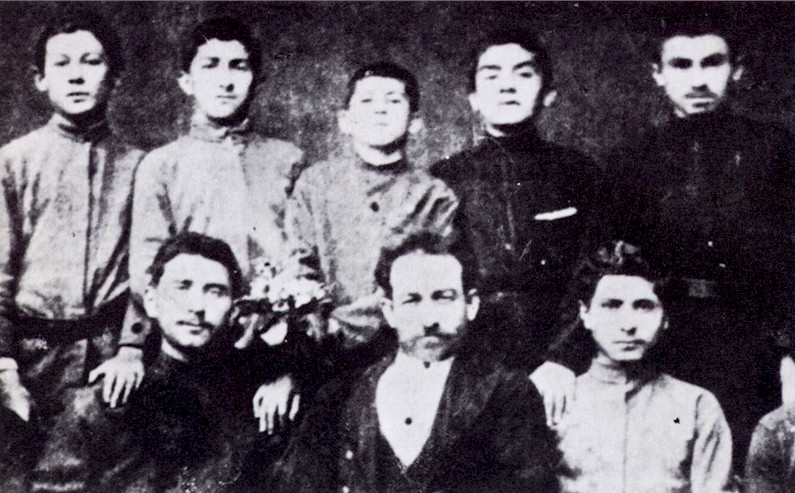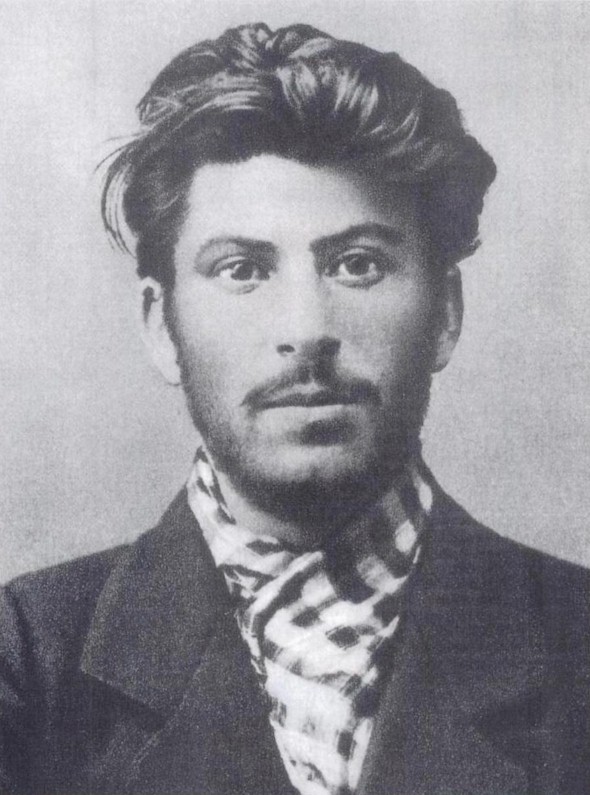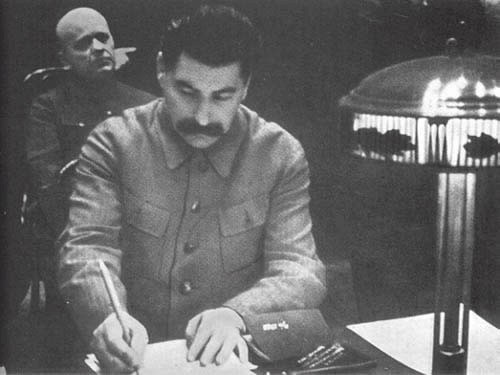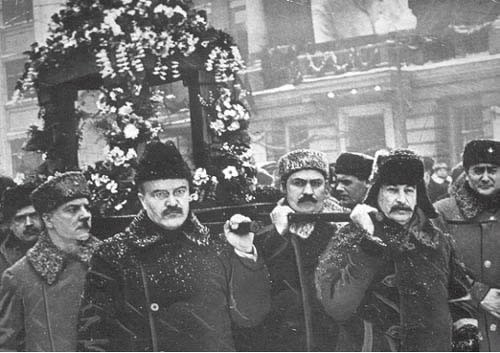Личность Сталина
Русский > Контекст > Политический контекст > Сталинская эпоха
Stalin was a man of contradictions. He was self-taught, with a strong discipline he had started self-tuition. At the end of his life, when he had to discuss with his staff the upcoming war in Korea and its timing, Stalin was working on a long article about linguistics. Stalin was just an amateur-linguistician, which did not prevent him from publishing a long and boring article in the Pravda on June 20 with the title: Marxism and the problems of linguistics. Four days later the Korean war broke out, a test of power with the Americans, during which Chinese and Korean communists had to do his dirty work. Stalin refused to support them with the Soviet air forces. Stalin had a boundless conceitedness, he was a restless reader of 20.000 books on history and literature, he maintained that he read up to 500 pages a day. He had made up his name and date of birth himself, and was a paranoiac with many faces, an impenetrable sphinx, calculating but incalculable, obsessed by blackmailing, tortures and executions.
Stalin wasn't born on December 21, 1879, like he had made up himself, but on December 6 [18], 1878, in Gory, a small town in Georgia, thousands of kilometers from Moscow, and closer to Bagdad than to Saint.-Petersburg. The sunny Georgia was, from the late Middle Ages (from the 13th to the 15th century) part of the Mongolian Empire, and later the Ottoman Empire (1510-1810) and it was only conquered by Russia between 1810 and 1878. Stalin loved his native country. His real name was Josef Vissarionovich Dzhugashvili. His father was a drinking, brutal, wandering cobbler. Stalin became atheist at the seminary and was therefore sent away after five years. Then he became a professional revolutionary; he earned his moment by robberies and thefts. He participated to party congresses in Finland, Prague and London. And as an exile he got acquainted with Siberia.
During his whole career Stalin acted as a censor. He even re-wrote parts of the work of Maxim Gorky, he said that the poets Osip Emilevich Mandelstam (1891-1935) and Anna Akhmatova, pseudonym of Anna Andreevna Gorenko (1889-1966) were geniuses, while he censored their works. He had a tender spot for Mikhail Bulgakov's theatre plays. But Bulgakov was not allowed to publish in the Soviet Union. Stalin looked attentively on movie, theatre and opera productions personally. He often decided himself on which movies could be shown and which couldn't, on which theatre or opera performances could be organised and which couldn't.
Stalin was quite aware of the cult he was turned into. His environment called him leader and father and he didn't mind at all. But sometimes it was too much, even for him. Ivan Stepanovich Konev (1897-1973), Georgy Maximilianovich Malenkov (1902-1988) and Vyacheslav Mikhailovitsj Molotov (1890-1986) wanted to offer him the title of generalissimus after World War II. But Stalin was against it and told Konev: "Comrade Stalin doesn't need this. Comrade Stalin has got sufficient authority without this title. Chiang Kai-shek is a generalissimus, Franco is a generalissimo - quite a pleasant company for me!".
Stalin was also an unrestrained director. When he wanted to abolish the writers' union RAPP many famous writers received a telephone call. They were invited to come to Maxim Gorky because Stalin wanted them to dissolve the RAPP "spontaneously", on "their own initiative". Among those present was Mikhail Alexandrovich Sholokhov (1905-1984), author of the famous novel Quiet Flows the Don, which won the Stalin Prize in 1941. It was told that Sholokhov had stolen this novel from a Cossacks officer who was killed in action. Nobody believed that such young and unintelligent man had written such wonderful novel. Sholokhov was Stalin's writer, promoted by him, and he threatened to arrest all those who dared to say bad things on Sholokhov. The authorship of Quiet Flows the Don became one of the most intriguing literary mysteries of the century. Many critics, among which Aleksander Solzhenitsyn, claimed that the real author of the novel was Fyodor Dimitrievich Kryukov, a cossack and anti-bolshevik writer who died from décédé de typhoid fever in 1920.
A good example of Stalin’s cynicism and his complete lack of feeling for human dignity is the story of Grigoriy Konstantinovich Ordzhonikidze (1886-1937). Ordzhonikidze became a member of the Politburo in 1926, he was a good friend of Stalin, but in 1936 Stalin started doubting his loyalty. He had discovered that Ordzhonikidze used his influence to protect some people who were questioned by the NKVD. There were also rumours that Ordzhonikidze was considering to challenge Stalin in a speech that he would make in April 1937. Ordzhonikidze was found dead before he could have his speech, his death was registered as a suicide. According to the memoirs of Khrushchev, Ordzhonikidze had told on the eve of his death to Anastas Ivanovich Mikoyan (1895-1978), a member of the Caucasian Party, that he could no longer support the arbitrary killing of party members. Stalin insisted that he could be among the ones who would carry Ordzhonikidze’s coffin, and so it happened.
Stalin lived in the Kremlin. It was a private paradise with four meter thick walls for the families of the leaders. They lived their most parts of the year with their children, as one big family, in spacious apartments, in all luxury and in contrast with the sad situation of the people. The court was a place of decadence, love affairs, banquets and bacchanalia with litres of brandy and vodka. Sometimes Stalin got drunk himself, in October 1945 he was even left with a heart attack, but usually he forced his staff and later his East European vassals to drink themselves stupid. The top of the nomenclatura had spacious mansions and dacha’s (cottages), with all possible comfort and staff. These cottages were close to Moscow, or in Sochi at the Black Sea, on the Crimean and in Georgia. They were equipped with bugging devices and the potentates were not allowed to visit each other. Stalin was rather sober himself, but his son Vasily liked to show himself with the most expensive foreign cars. They went on vacation together, by private trains to the south. When they opened their curtains, they could see how the Ukrainian farmers died from the organized famine.
Поместить эту страницу |
Политический контекст
Иллюстрации
Сталин в семинарии в Тбилисе в 1896
Молодой Сталин в 1902
Сталин настаивал, чтобы подписать смертные казни лично
Сталин помогает нести гроб Орджоникидзе



